外研版七年级下册 Module 11 Body language 模块复习课件(共51张PPT)
文档属性
| 名称 | 外研版七年级下册 Module 11 Body language 模块复习课件(共51张PPT) |  | |
| 格式 | pptx | ||
| 文件大小 | 356.2KB | ||
| 资源类型 | 教案 | ||
| 版本资源 | 外研版 | ||
| 科目 | 英语 | ||
| 更新时间 | 2022-08-27 21:48:26 | ||
图片预览

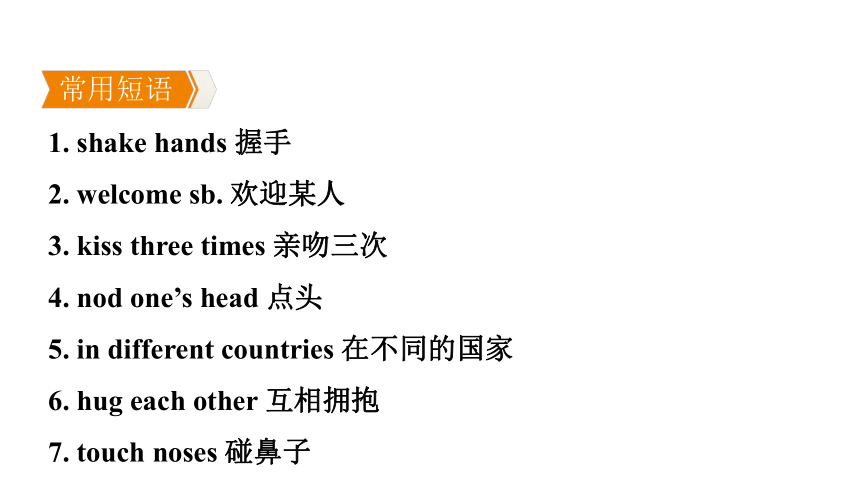
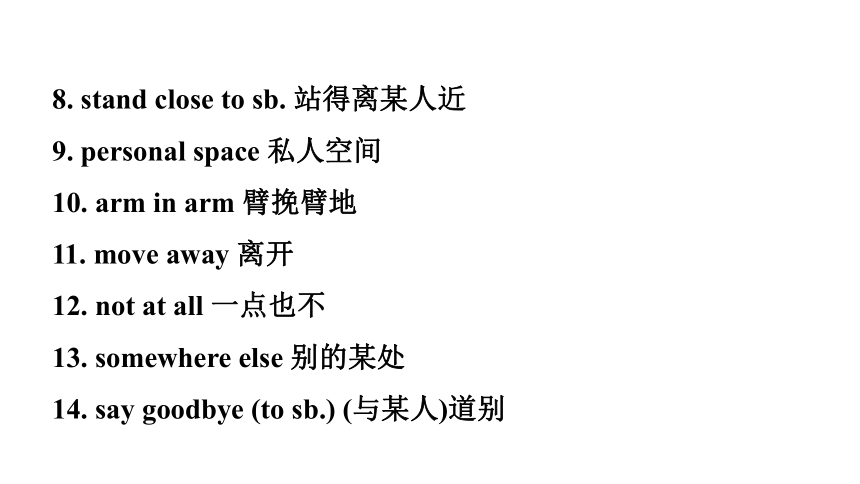
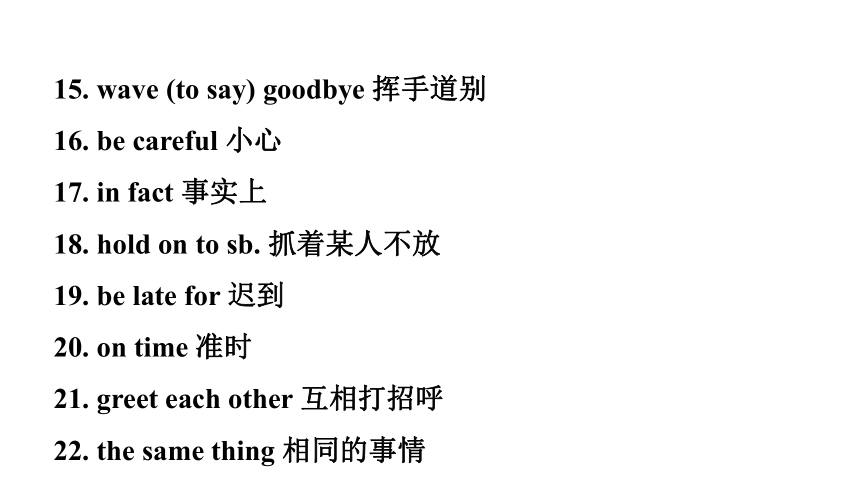
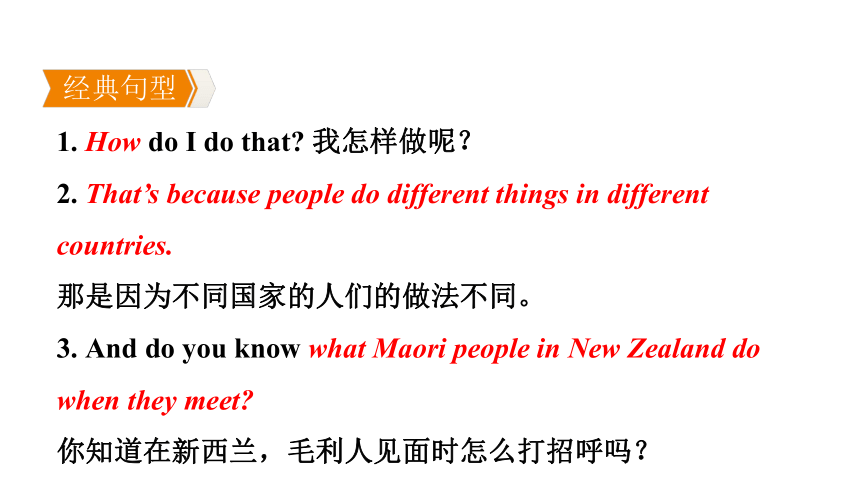
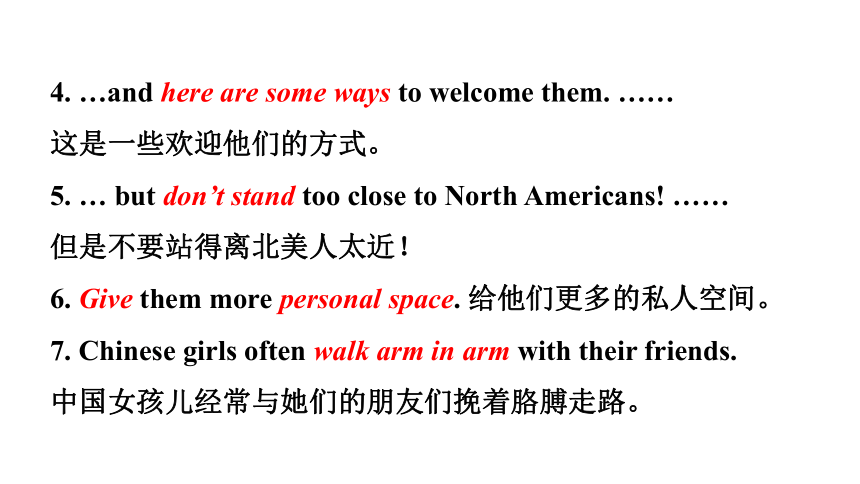
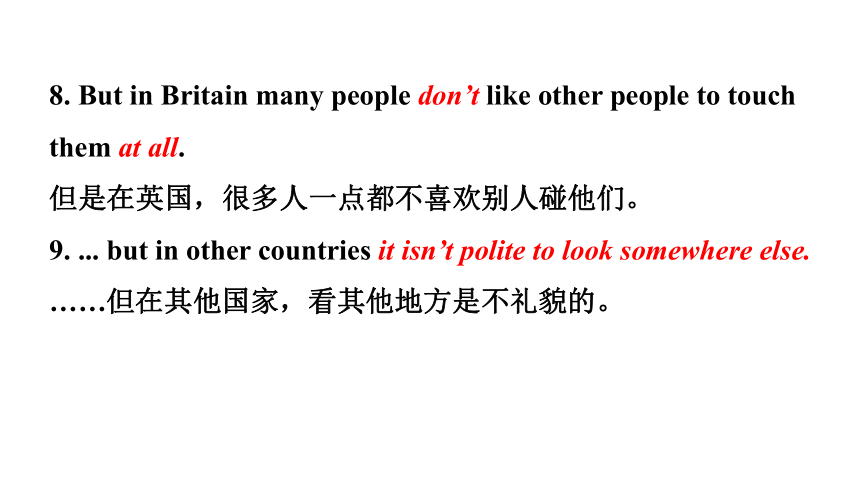
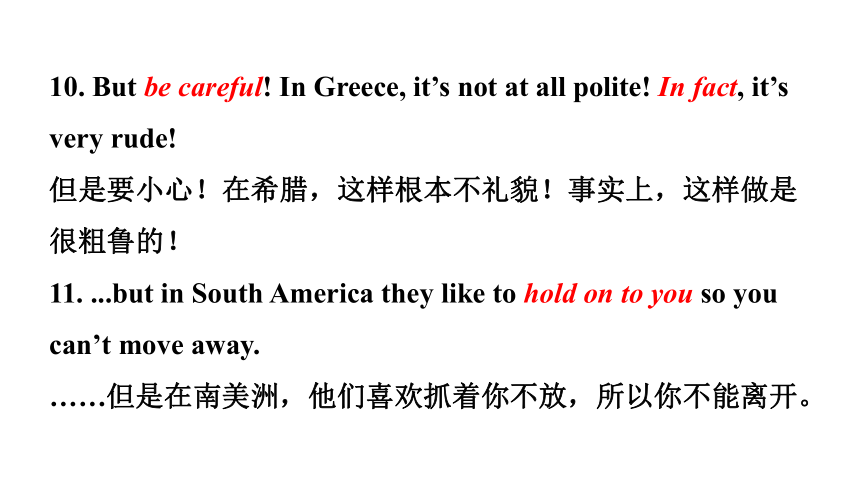
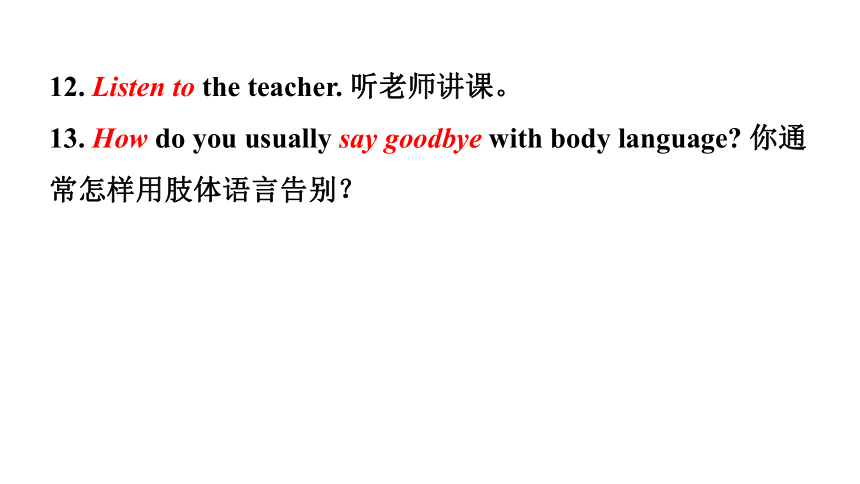

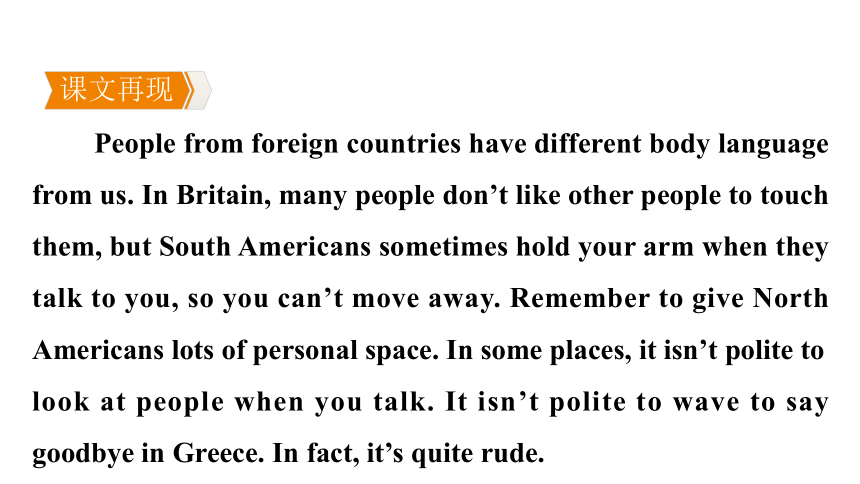

文档简介
(共51张PPT)
Module 11 Body language
模块知识盘点
常用短语
1. shake hands 握手
2. welcome sb. 欢迎某人
3. kiss three times 亲吻三次
4. nod one’s head 点头
5. in different countries 在不同的国家
6. hug each other 互相拥抱
7. touch noses 碰鼻子
8. stand close to sb. 站得离某人近
9. personal space 私人空间
10. arm in arm 臂挽臂地
11. move away 离开
12. not at all 一点也不
13. somewhere else 别的某处
14. say goodbye (to sb.) (与某人)道别
15. wave (to say) goodbye 挥手道别
16. be careful 小心
17. in fact 事实上
18. hold on to sb. 抓着某人不放
19. be late for 迟到
20. on time 准时
21. greet each other 互相打招呼
22. the same thing 相同的事情
经典句型
1. How do I do that 我怎样做呢?
2. That’s because people do different things in different countries.
那是因为不同国家的人们的做法不同。
3. And do you know what Maori people in New Zealand do when they meet
你知道在新西兰,毛利人见面时怎么打招呼吗?
4. …and here are some ways to welcome them. ……
这是一些欢迎他们的方式。
5. … but don’t stand too close to North Americans! ……
但是不要站得离北美人太近!
6. Give them more personal space. 给他们更多的私人空间。
7. Chinese girls often walk arm in arm with their friends.
中国女孩儿经常与她们的朋友们挽着胳膊走路。
8. But in Britain many people don’t like other people to touch them at all.
但是在英国,很多人一点都不喜欢别人碰他们。
9. ... but in other countries it isn’t polite to look somewhere else.
……但在其他国家,看其他地方是不礼貌的。
10. But be careful! In Greece, it’s not at all polite! In fact, it’s very rude!
但是要小心!在希腊,这样根本不礼貌!事实上,这样做是很粗鲁的!
11. ...but in South America they like to hold on to you so you can’t move away.
……但是在南美洲,他们喜欢抓着你不放,所以你不能离开。
12. Listen to the teacher. 听老师讲课。
13. How do you usually say goodbye with body language 你通常怎样用肢体语言告别?
语法点睛
1. 肯定的祈使句
2. 否定的祈使句
3. 祈使句的答语
课文再现
People from foreign countries have different body language from us. In Britain, many people don’t like other people to touch them, but South Americans sometimes hold your arm when they talk to you, so you can’t move away. Remember to give North Americans lots of personal space. In some places, it isn’t polite to look at people when you talk. It isn’t polite to wave to say goodbye in Greece. In fact, it’s quite rude.
模块专题聚焦
命题情报
祈使句表请求、命令、叮嘱、劝告等,祈使句的句型并不难理解,但是,同学们容易把祈使句中的谓语动词和非谓语动词形式搞混,这一点在学习中一定要注意区分。
巧品语法
语法精讲
祈使句
概念 祈使句是用来表达叮嘱、劝告、希望、禁止、请求 或命令等的句子。
形式 祈使句有肯定句和否定句之分。
Do型 Go and ask the teacher. 去问问老师。
Come and meet my family. 来见见我的家人。
Be型 Please be quiet! 请安静!
Be brave. 勇敢点。
Let型 Let’s go home together. 我们一起回家吧。
Let him go. 让他走吧
1. 肯定的祈使句
[注意] 为了使祈使句的语气更委婉,可以在句首或句尾加please。
Come here, please.
请来这儿。
Please look after your little sister.
请照顾你的小妹妹。
2. 否定的祈使句
1.否定的祈使句通常以“Don’t+动词原形”开头。
Don’t go to the forest alone. 不要独自去森林。
Don’t be late for class again. 不要再上课迟到了。
Don’t let him in. 不要让他进来。
2. “Let sb. do sth.”结构的否定形式为“Let sb. not do sth.”。
Let’s not sit here! 我们不要坐在这儿!
No+名词. No pets. 禁止携带宠物。
No photos. 禁止拍照。
No+动名词. No fishing. 禁止钓鱼。
No parking. 禁止停车。
No swimming. 禁止游泳。
[拓展]
“No+名词/动名词”也属于祈使句的否定结构。
3. 祈使句的答语
祈使句用一般将来时来回答。
—Don’t draw on the wall. 不要在墙上画画。
—I won’t do it again. 我不会再画了。
—Please open the door. 请开一下门。
—OK, I will. 好的,我会的。
1. |济南中考| —________up, Anna. It’s seven thirty.
—One more minute, Mum.
A. Get B. Gets
C. Getting D. Got
考点直击
A
2. |河南中考| Do you want to be healthy ________.
Smiling can help you stay healthy.
A. Smile B. Smiling
C. To smile D. Smiled
A
3. —________any food in class.
—Sorry, I won’t.
A. Don’t eat B. Not eat
C. No eat D. Not to eat
A
4. —________late again.
—Sorry, I won’t.
A. No B. Not be
C. Don’t be D. Be not
C
5. |黄石中考| ________ to smile at your life when you are in trouble, and you will soon be happy again.
A. Try B. To try
C. Trying D. Tried
A
6. |攀枝花中考| ________your umbrella, or you’ll catch a
cold on such a rainy day.
A. Take B. To take
C. Taking D. Takes
A
7. |湘西中考| —________run in the hallways, Mike.
—Sorry, Ms Clark.
A. Don’t B. Please C. No
8. |广东中考| Tommy, ________play basketball in the street next time. You may get hit by a car.
A. do B. don’t
C. must D. mustn’t
A
B
9. |泰安中考| As we all know, life is short but amazing.
________it!
A. Enjoy B. To enjoy C. Enjoying D. Enjoyed
10. |绥化中考| ________swim in the river alone, Karen.
It’s too dangerous.
A. Not B. Don’t C. Doesn’t
A
B
Ⅱ.根据汉语意思翻译句子
1. 请认真听我说。
_____________________________________________________
2. 不要站得离我太近。
_____________________________________________________
3. 请保持安静。
_____________________________________________________
Please listen to me carefully.
Don't stand too close to me.
Please keep/be quiet.
4. 请告诉我你的名字和地址。
_____________________________________________________
5. 禁止钓鱼。
_____________________________________________________
6. 不要在课堂上听音乐。
_____________________________________________________
7. 不要在街道上跑。
_____________________________________________________
Please tell me your name and address.
No fishing.
Don't listen to music in class.
Don't run in the streets.
8. 禁止吸烟。
_____________________________________________________
No smoking.
如何写好以“肢体语言”为话题的文章
本模块的话题是谈论“肢体语言”,该话题是和文化有关的内容。在学习语言的时候,我们也要注意了解西方文化,注意中西方文化之间的差异。此类文章不是我们经常接触到的话题,写作起来有一定的难度。在写作时,要根据生活经验和常识来写。现在,就让我们一起结合实例来看看此类文章的写作技巧吧!
妙解写作
写 作 案 例
下表列举了不同国家的人见面时的一些肢体语言。请你根据下表的提示内容,写一篇英语文章,描述不同的国家对应的肢体语言。
中国 经常握手;有时点头;从不亲吻。
美国 握手;有些人亲吻或拥抱。
俄罗斯 通常亲吻三下。
要求:1. 词数:60词左右;
2. 必须包含上述信息,可适当发挥想象。
__________________________________________________________________________________________________________________________________________________________________
素 材 积 累
词汇库
nod 点(头) shake 摇晃 kiss 亲吻
smile 微笑 hug 拥抱 personal个人的 polite 礼貌的 wave 挥(手) rude 粗鲁的
touch 触摸 bow 鞠躬 visitor 游客
短语箱
shake hands with sb. 与某人握手
nod to sb. 向某人点头
each other 互相
smile at sb. 对某人微笑
personal space 个人空间
arm in arm 臂挽臂地
say goodbye to sb. 向某人告别
body language 肢体语言
句式链
① It’s necessary/polite/rude to ... ……
是必要的/礼貌的/粗鲁的。
② In China/America/India, people usually...
在中国/美国/印度,人们通常……
③ They always...when they meet visitors.
当他们遇到来访者时,他们总是……
④ That’s because... 那是因为……
五 步 妙 解
审
体裁 说明文 话题 肢体语言
时态 一般现在时 人称 第三人称
段落 布局 开头:引起下文。
主体:描述不同国家不同的肢体语言。 遣
当你参观其他国家时,了解肢体语言是必要的。
汉译英: __________________________________________
______________________
It‘s necessary to know about body language when
you visit other countries.
模
引起下文
描述不同国家的肢体语言
In different countries, people have
Different body language when they meet.
Russia—usually kiss three times
China—often shake hands, sometimes nod their heads, never kiss
the US—shake hands, kiss or hug
In different countries, people have different body language when they meet. It’s necessary to know about body language when you visit other countries. In China, people often shake hands. They sometimes nod their heads. But they never kiss. In the US, some people shake hands. Some people kiss or hug each other. In Russia, people usually kiss three times.
润
点
1. 全文语言通顺,语意连贯,层次清楚,信息表达完整,详细介绍了中国、美国、俄罗斯这
三个国家见面时的肢体语言。
2. 作者准确地使用了一般现在时,将三个国家的特点描述出来,作者运用的词汇和句型也很到位,如:it’s necessary to do sth.,sometimes,but,or等。
小 试 身 手
请根据你的生活经验,描述你所了解到的中国礼仪方面的肢体语言。要求至少从两个方面进行描述。
如:1. 见面时通常微笑、握手; 2. 不要站得离别人太近。
要求:1. 词数:50词左右;
2. 可适当发挥想象。
____________________________________________________
______________________________________________
One possible version:
In China, people use different body language in different situations. First, when we meet visitors, we usually smile. We also shake hands with visitors. Second, don't stand too close to others. If you stand too close to a person, the person may feel uncomfort able.
还原短文解题技巧
此类试题主要考查学生是否理解故事情节、事件发展顺序和段落中各句子之间的逻辑关系。根据以上分析得出此类试题考查的文体主要为记叙文。记叙文的六要素为时间、地点、人物、起因、经过和结果。因此,根据记叙文常见的写作顺序可知其解题思路主要为时间顺序、动作顺序和故事发展顺序。此外,关注段落中各句子之间的逻辑关系,主要为并列、转折、因果关系及其他关系(单词重复、代词指代、排比句式等)。
培优课堂
针对阅读短文还原句子的考查点,我们总结出此类题型的解题步骤及得分技巧,具体如下:
1. 解题步骤
(1)读选项,画关键词,暗排序。(2)读文章,找逻辑,抓过渡词。
(3)先易后难来解题。(4)回读文章定答案。
2. 得分技巧
(1)抓住过渡词,看住上下句。(2)盯紧横线的前后词语。
【典例】
Do you like movies
Hi! My name is Marco. Do you like movies I do. I like movies, too.
very much. Everyone else in my family likes movies, too.
1. ______ Sometimes we go to the cinema to watch movies. Sometimes we watch movies at home. When we watch movies at home, we see them on DVDs. We also watch movies on the Internet.
My favourite movies are action movies. I think they are exciting. 2. ______ She does not like the same kind of movies as I do. She likes funny movies. My father likes to watch movies about real things and real people. 3. ______ She likes all kinds of movies.
Last week we watched an old movie. It is called The Sound of Music. 4. ______ They were very good singers. In the movie, the mother died. The father and the children needed a new
mother. 5. ______ At the end of the movie, the family was safe and they got a new mother. I liked the movie because it had a happy ending.
根据短文内容,从方框中选出合适的句子,填在短文空缺处,使短文内容完整、连贯。
A. My sister likes to watch movies, too.
B. The family was also in danger.
C. My mother is different from all of us.
D. It is about a family living in Austria.
E. My family watch movies in different ways.
【答案】1—5 EACDB
谢 谢 观 看!
Module 11 Body language
模块知识盘点
常用短语
1. shake hands 握手
2. welcome sb. 欢迎某人
3. kiss three times 亲吻三次
4. nod one’s head 点头
5. in different countries 在不同的国家
6. hug each other 互相拥抱
7. touch noses 碰鼻子
8. stand close to sb. 站得离某人近
9. personal space 私人空间
10. arm in arm 臂挽臂地
11. move away 离开
12. not at all 一点也不
13. somewhere else 别的某处
14. say goodbye (to sb.) (与某人)道别
15. wave (to say) goodbye 挥手道别
16. be careful 小心
17. in fact 事实上
18. hold on to sb. 抓着某人不放
19. be late for 迟到
20. on time 准时
21. greet each other 互相打招呼
22. the same thing 相同的事情
经典句型
1. How do I do that 我怎样做呢?
2. That’s because people do different things in different countries.
那是因为不同国家的人们的做法不同。
3. And do you know what Maori people in New Zealand do when they meet
你知道在新西兰,毛利人见面时怎么打招呼吗?
4. …and here are some ways to welcome them. ……
这是一些欢迎他们的方式。
5. … but don’t stand too close to North Americans! ……
但是不要站得离北美人太近!
6. Give them more personal space. 给他们更多的私人空间。
7. Chinese girls often walk arm in arm with their friends.
中国女孩儿经常与她们的朋友们挽着胳膊走路。
8. But in Britain many people don’t like other people to touch them at all.
但是在英国,很多人一点都不喜欢别人碰他们。
9. ... but in other countries it isn’t polite to look somewhere else.
……但在其他国家,看其他地方是不礼貌的。
10. But be careful! In Greece, it’s not at all polite! In fact, it’s very rude!
但是要小心!在希腊,这样根本不礼貌!事实上,这样做是很粗鲁的!
11. ...but in South America they like to hold on to you so you can’t move away.
……但是在南美洲,他们喜欢抓着你不放,所以你不能离开。
12. Listen to the teacher. 听老师讲课。
13. How do you usually say goodbye with body language 你通常怎样用肢体语言告别?
语法点睛
1. 肯定的祈使句
2. 否定的祈使句
3. 祈使句的答语
课文再现
People from foreign countries have different body language from us. In Britain, many people don’t like other people to touch them, but South Americans sometimes hold your arm when they talk to you, so you can’t move away. Remember to give North Americans lots of personal space. In some places, it isn’t polite to look at people when you talk. It isn’t polite to wave to say goodbye in Greece. In fact, it’s quite rude.
模块专题聚焦
命题情报
祈使句表请求、命令、叮嘱、劝告等,祈使句的句型并不难理解,但是,同学们容易把祈使句中的谓语动词和非谓语动词形式搞混,这一点在学习中一定要注意区分。
巧品语法
语法精讲
祈使句
概念 祈使句是用来表达叮嘱、劝告、希望、禁止、请求 或命令等的句子。
形式 祈使句有肯定句和否定句之分。
Do型 Go and ask the teacher. 去问问老师。
Come and meet my family. 来见见我的家人。
Be型 Please be quiet! 请安静!
Be brave. 勇敢点。
Let型 Let’s go home together. 我们一起回家吧。
Let him go. 让他走吧
1. 肯定的祈使句
[注意] 为了使祈使句的语气更委婉,可以在句首或句尾加please。
Come here, please.
请来这儿。
Please look after your little sister.
请照顾你的小妹妹。
2. 否定的祈使句
1.否定的祈使句通常以“Don’t+动词原形”开头。
Don’t go to the forest alone. 不要独自去森林。
Don’t be late for class again. 不要再上课迟到了。
Don’t let him in. 不要让他进来。
2. “Let sb. do sth.”结构的否定形式为“Let sb. not do sth.”。
Let’s not sit here! 我们不要坐在这儿!
No+名词. No pets. 禁止携带宠物。
No photos. 禁止拍照。
No+动名词. No fishing. 禁止钓鱼。
No parking. 禁止停车。
No swimming. 禁止游泳。
[拓展]
“No+名词/动名词”也属于祈使句的否定结构。
3. 祈使句的答语
祈使句用一般将来时来回答。
—Don’t draw on the wall. 不要在墙上画画。
—I won’t do it again. 我不会再画了。
—Please open the door. 请开一下门。
—OK, I will. 好的,我会的。
1. |济南中考| —________up, Anna. It’s seven thirty.
—One more minute, Mum.
A. Get B. Gets
C. Getting D. Got
考点直击
A
2. |河南中考| Do you want to be healthy ________.
Smiling can help you stay healthy.
A. Smile B. Smiling
C. To smile D. Smiled
A
3. —________any food in class.
—Sorry, I won’t.
A. Don’t eat B. Not eat
C. No eat D. Not to eat
A
4. —________late again.
—Sorry, I won’t.
A. No B. Not be
C. Don’t be D. Be not
C
5. |黄石中考| ________ to smile at your life when you are in trouble, and you will soon be happy again.
A. Try B. To try
C. Trying D. Tried
A
6. |攀枝花中考| ________your umbrella, or you’ll catch a
cold on such a rainy day.
A. Take B. To take
C. Taking D. Takes
A
7. |湘西中考| —________run in the hallways, Mike.
—Sorry, Ms Clark.
A. Don’t B. Please C. No
8. |广东中考| Tommy, ________play basketball in the street next time. You may get hit by a car.
A. do B. don’t
C. must D. mustn’t
A
B
9. |泰安中考| As we all know, life is short but amazing.
________it!
A. Enjoy B. To enjoy C. Enjoying D. Enjoyed
10. |绥化中考| ________swim in the river alone, Karen.
It’s too dangerous.
A. Not B. Don’t C. Doesn’t
A
B
Ⅱ.根据汉语意思翻译句子
1. 请认真听我说。
_____________________________________________________
2. 不要站得离我太近。
_____________________________________________________
3. 请保持安静。
_____________________________________________________
Please listen to me carefully.
Don't stand too close to me.
Please keep/be quiet.
4. 请告诉我你的名字和地址。
_____________________________________________________
5. 禁止钓鱼。
_____________________________________________________
6. 不要在课堂上听音乐。
_____________________________________________________
7. 不要在街道上跑。
_____________________________________________________
Please tell me your name and address.
No fishing.
Don't listen to music in class.
Don't run in the streets.
8. 禁止吸烟。
_____________________________________________________
No smoking.
如何写好以“肢体语言”为话题的文章
本模块的话题是谈论“肢体语言”,该话题是和文化有关的内容。在学习语言的时候,我们也要注意了解西方文化,注意中西方文化之间的差异。此类文章不是我们经常接触到的话题,写作起来有一定的难度。在写作时,要根据生活经验和常识来写。现在,就让我们一起结合实例来看看此类文章的写作技巧吧!
妙解写作
写 作 案 例
下表列举了不同国家的人见面时的一些肢体语言。请你根据下表的提示内容,写一篇英语文章,描述不同的国家对应的肢体语言。
中国 经常握手;有时点头;从不亲吻。
美国 握手;有些人亲吻或拥抱。
俄罗斯 通常亲吻三下。
要求:1. 词数:60词左右;
2. 必须包含上述信息,可适当发挥想象。
__________________________________________________________________________________________________________________________________________________________________
素 材 积 累
词汇库
nod 点(头) shake 摇晃 kiss 亲吻
smile 微笑 hug 拥抱 personal个人的 polite 礼貌的 wave 挥(手) rude 粗鲁的
touch 触摸 bow 鞠躬 visitor 游客
短语箱
shake hands with sb. 与某人握手
nod to sb. 向某人点头
each other 互相
smile at sb. 对某人微笑
personal space 个人空间
arm in arm 臂挽臂地
say goodbye to sb. 向某人告别
body language 肢体语言
句式链
① It’s necessary/polite/rude to ... ……
是必要的/礼貌的/粗鲁的。
② In China/America/India, people usually...
在中国/美国/印度,人们通常……
③ They always...when they meet visitors.
当他们遇到来访者时,他们总是……
④ That’s because... 那是因为……
五 步 妙 解
审
体裁 说明文 话题 肢体语言
时态 一般现在时 人称 第三人称
段落 布局 开头:引起下文。
主体:描述不同国家不同的肢体语言。 遣
当你参观其他国家时,了解肢体语言是必要的。
汉译英: __________________________________________
______________________
It‘s necessary to know about body language when
you visit other countries.
模
引起下文
描述不同国家的肢体语言
In different countries, people have
Different body language when they meet.
Russia—usually kiss three times
China—often shake hands, sometimes nod their heads, never kiss
the US—shake hands, kiss or hug
In different countries, people have different body language when they meet. It’s necessary to know about body language when you visit other countries. In China, people often shake hands. They sometimes nod their heads. But they never kiss. In the US, some people shake hands. Some people kiss or hug each other. In Russia, people usually kiss three times.
润
点
1. 全文语言通顺,语意连贯,层次清楚,信息表达完整,详细介绍了中国、美国、俄罗斯这
三个国家见面时的肢体语言。
2. 作者准确地使用了一般现在时,将三个国家的特点描述出来,作者运用的词汇和句型也很到位,如:it’s necessary to do sth.,sometimes,but,or等。
小 试 身 手
请根据你的生活经验,描述你所了解到的中国礼仪方面的肢体语言。要求至少从两个方面进行描述。
如:1. 见面时通常微笑、握手; 2. 不要站得离别人太近。
要求:1. 词数:50词左右;
2. 可适当发挥想象。
____________________________________________________
______________________________________________
One possible version:
In China, people use different body language in different situations. First, when we meet visitors, we usually smile. We also shake hands with visitors. Second, don't stand too close to others. If you stand too close to a person, the person may feel uncomfort able.
还原短文解题技巧
此类试题主要考查学生是否理解故事情节、事件发展顺序和段落中各句子之间的逻辑关系。根据以上分析得出此类试题考查的文体主要为记叙文。记叙文的六要素为时间、地点、人物、起因、经过和结果。因此,根据记叙文常见的写作顺序可知其解题思路主要为时间顺序、动作顺序和故事发展顺序。此外,关注段落中各句子之间的逻辑关系,主要为并列、转折、因果关系及其他关系(单词重复、代词指代、排比句式等)。
培优课堂
针对阅读短文还原句子的考查点,我们总结出此类题型的解题步骤及得分技巧,具体如下:
1. 解题步骤
(1)读选项,画关键词,暗排序。(2)读文章,找逻辑,抓过渡词。
(3)先易后难来解题。(4)回读文章定答案。
2. 得分技巧
(1)抓住过渡词,看住上下句。(2)盯紧横线的前后词语。
【典例】
Do you like movies
Hi! My name is Marco. Do you like movies I do. I like movies, too.
very much. Everyone else in my family likes movies, too.
1. ______ Sometimes we go to the cinema to watch movies. Sometimes we watch movies at home. When we watch movies at home, we see them on DVDs. We also watch movies on the Internet.
My favourite movies are action movies. I think they are exciting. 2. ______ She does not like the same kind of movies as I do. She likes funny movies. My father likes to watch movies about real things and real people. 3. ______ She likes all kinds of movies.
Last week we watched an old movie. It is called The Sound of Music. 4. ______ They were very good singers. In the movie, the mother died. The father and the children needed a new
mother. 5. ______ At the end of the movie, the family was safe and they got a new mother. I liked the movie because it had a happy ending.
根据短文内容,从方框中选出合适的句子,填在短文空缺处,使短文内容完整、连贯。
A. My sister likes to watch movies, too.
B. The family was also in danger.
C. My mother is different from all of us.
D. It is about a family living in Austria.
E. My family watch movies in different ways.
【答案】1—5 EACDB
谢 谢 观 看!
同课章节目录
- Module 1 Lost and found
- Unit 1 Whose bag is this?
- Unit 2 Are they yours?
- Unit 3 Language in use
- Module 2 What can you do ?
- Unit 1 I can play the piano
- Unit 2 I can run really fast
- Unit 3 Language in use
- Module 3 Making plans
- Unit 1 What are you going to do at the weekends?
- Unit 2 We're going to cheer the players.
- Unit 3 Language in use
- Module 4 Life in the future
- Unit 1 Everyone will study at home
- Unit 2 Every family will have a small plane.
- Unit 3 Language in use
- Module 5 Shopping
- Unit 1 What can I do for you?
- Unit 2 You can buy everything on the Internet
- Unit 3 Language in use
- Module 6 Around town
- Unit 1 Could you tell me how to get to the Nationa
- Unit 2 The London Eye is on your right.
- Unit 3 Language in use
- Revision module A
- Module 7 My past life
- Unit 1 I was born in a small village.
- Unit 2 I was born in Quincy.
- Unit 3 Language in use
- Module 8 Story time
- Unit 1 Once upon a time….
- Unit 2 Goldilocks hurried out of the house.
- Unit 3 Language in use
- Module 9 Life history
- Unit 1 He left school and began work at the age of
- Unit 2 He decided to be an actor.
- Unit 3 Language in use
- Module 10 A holiday journey
- Unit 1 What did you do?
- Unit 2 This morning we took a walk.
- Unit 3 Language in use
- Module 11 Body language
- Unit 1 They touch noses!
- Unit 2 Here are some ways to welcome them.
- Unit 3 Language in use
- Module 12 Western music
- Unit 1 It's so beautiful!
- Unit 2 Vienna is the centre of European classical
- Unit 3 Language in use
- Revision module B
